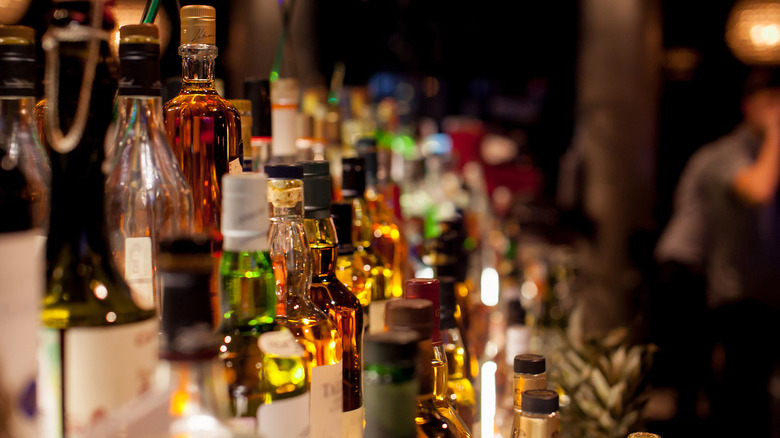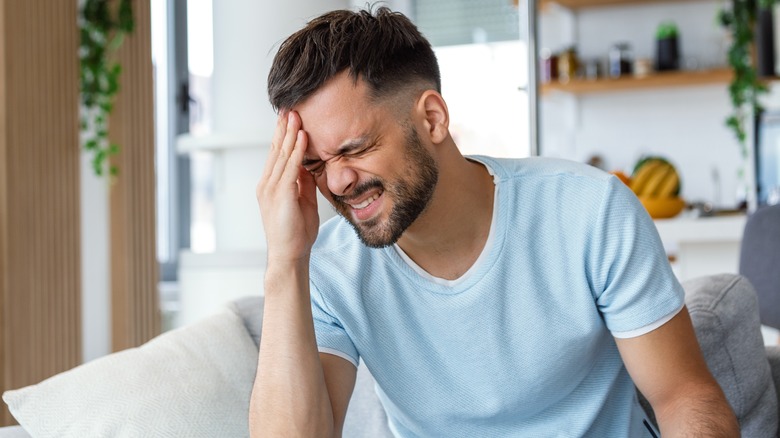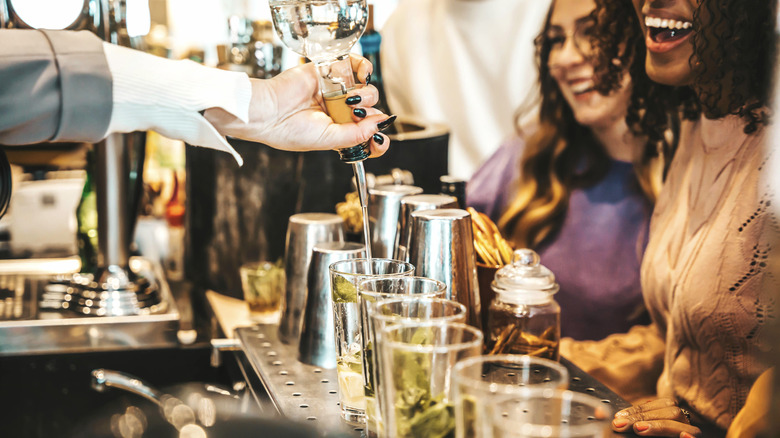What It Means To Order A Well Drink Vs A Call Drink At The Bar
Knowing some basic bartender lingo when ordering drinks at the bar is helpful, especially during the happy hour rush. If you ask for a drink without specifying a brand of liquor, such as a rum and Coke, you've ordered what bartenders call a "well drink." On the other hand, if you specify the liquor brand, for instance, a Bacardi and Coke, you've ordered a "call drink." A well drink, also called a rail drink, is made with the house brand of liquor, which is generally less expensive than premium brands. It's called a well drink because the low-cost liquor is kept in the well at the bar (also called a speed rail). The well is easily accessible to the bartender, where common drink ingredients like mixes and simple syrups are kept.
Meanwhile, if you "call out" a specific brand of liquor for your mixed drink — Absolut and soda, Jack and Coke, Tanquerey and tonic — you'll get a higher quality liquor, which also means paying a higher price. Some premium bottles are classified as top-shelf, which is a step up from call liquors in quality and price (this is why they are stored carefully on a high shelf). Keeping in mind that each bar has its own fee structure, some examples of top-shelf liquors include Grey Goose, Bacardi 151, Patron, Crown Royal, and Makers Mark.
Is it bad to order a well drink?
Although well drinks are made with inexpensive liquor, this doesn't always mean your drink will taste horrible, especially since they're usually mixed with soda or juice, which hides a lot of the flavor of the alcohol. But you may have noticed that your hangover is worse with cheaper booze. While there isn't enough research to 100% prove that cheap alcohol gives you worse hangovers, there are logical reasons why you might feel worse after drinking from the bottom shelf. For one, during the fermenting process of making alcohol, byproducts called congeners are produced (methanol, acetaldehyde, and tannins) that can be very toxic to the body and (in addition to ethanol) contribute to hangover side effects.
According to Livestrong, Laura J. Veach, Ph.D., a licensed clinical addiction specialist and professor at Wake Forest University School of Medicine, explains, "The more of these undesirable chemical byproducts, the greater the likelihood of a nastier hangover."
Research suggests that dark liquors contain more congeners and result in more severe hangovers. Pricier liquor brands generally use higher-quality filtering to remove unwanted congeners. Some top-shelf liquors have been distilled numerous times, resulting in purer alcohol, but this process requires greater financial cost. Cheaper booze may not have the same quality of filtering, but it still has to be filtered according to federal guidelines for safety. Cheap liquor also commonly contains more additives and lower-quality ingredients that can potentially make you feel worse in the morning.
Well vs. call drinks: a bartender's perspective
While low-quality liquor might make you feel worse the next day, the amount you drink is more likely to play a role in the severity of your hangover, confirms Dr. Veach. If the drinks are cheap, people (especially college students) will drink more, hence why happy hours are so popular. So, if you really want to avoid a hangover, worry more about quantity rather than quality.
The type of liquor used in well drinks varies per establishment and region, generally being the most economical choice for the bar. Well drinks can also be very profitable for bars since they are easy and low-cost to make. Bartenders, however, work for tips, so if you ask for a rum and Coke, they might try to upsell by asking what type of rum you want or suggesting a premium liquor.
In the Bartenders subreddit, when asked, "Do bartenders assume well liquor when ordering a cocktail?" most Redditors responded yes, while some said they would ask for a preference in order to upsell. However, one user responded that after looking at profit margins, they realized, "One well drink pays for the entire bottle while it takes 3-6 call drinks to pay for those respective bottles."
For the sake of keeping the bar profitable, they said it isn't worth upselling to premium liquors for a minimal increase in tips. That said, well liquors aren't always bottom of the barrel; Some high-end cocktail bars stock higher-quality well liquors.


